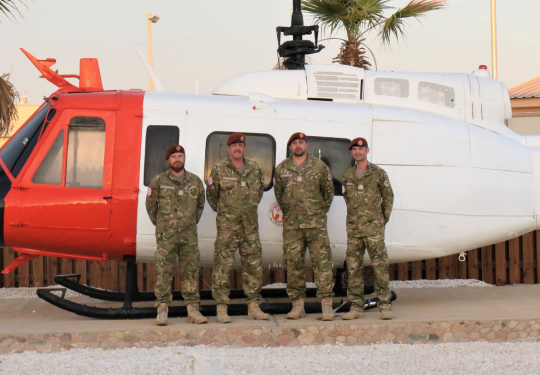Sailors in Sinai
Bringing your Navy skills to an operation doesn’t mean being at sea. The Royal New Zealand Navy is currently contributing four staff to the latest rotation of peacekeepers in the Sinai Peninsular in Egypt, as part of the Multinational Force and Observers
23 March, 2021
Operation Farad, as the deployment is known, involves 30 New Zealand Defence Force peacekeepers. It’s mostly Army, with four from Air Force, and four Navy personnel. After period of routine quarantine, on entry to Egypt, Commander Rob Welford, Chief Petty Officer Writer Bart Couprie, Petty Officer Marine Technician (Electrical) Stace Greer and Leading Electronic Warfare Specialist Daniel Lord started their MFO duties in the second week of November.
The origins of the MFO lie in the 1979 Treaty of Peace between Egypt and Israel, which was brokered by US President Jimmy Carter during the preceding Camp David talks. The two Treaty parties, Egypt and Israel, undertook to request the United Nations to provide a force and observers to supervise the implementation of the Treaty, but when this was not possible, they negotiated a further protocol establishing the MFO “as an alternative” to the envisioned UN force. The protocol was signed in 1981, and the MFO was established on the 25 April, Anzac Day, 1982. Since then, New Zealand has contributed Defence Force personnel to the force continuously. Command of the force rotates between nations, and the current commander is Major General Evan Williams, NZ Army.
Navy personnel bring their specialisations to the mission. CDR Welford, a Warfare Officer, is employed as the Force Commander's Executive Officer in the Headquarters at the MFO's South Camp near Sharm El Sheik, responsible for management of the Commander’s programme, and coordination staff effort in support of the force mission. CPOWTR Couprie, a Personnel Administration Specialist, is responsible for the New Zealand contingent’s administration, documentation and financial aspects. POMT(L) Greer is employed as the camp electrician supporting domestic appliances and infrastructure for the whole base. LEWS Lord is an analyst in the information cell, collating information from within the force, as well as external sources to provide briefing material and assessment to inform the planning and conduct of operations.
On a day-to-day basis the mission of the MFO is to Observe, Verify and Report (OVR) military and troop dispositions in the Sinai Peninsula and the areas adjacent to the International Border Line in both Egypt and Israel. The Force also plays a signification role in facilitating dialogue between the Egyptian Armed Forces and the Israeli Defence Force. In practical terms most of the OVR mission is conducted by the Civilian Observer Unit, with security, transport, planning, and logistical support from the military contingents, although it is emphasised that every member of the MFO is an ‘observer’ and the ability to recognise both Egyptian and Israeli military equipment is a core skill that is trained and practised regularly. Similarly, the Facilitation mission is conducted by providing planning, security, transport (including fixed wing aircraft and helicopters) to shuttle Treaty Partner representatives and VIPs between the two countries, and also to host meetings and dialogue at ‘neutral’ MFO bases and facilities.
Given that in the 30 years preceding the Treaty of Peace, Egypt and Israel had fought four wars, but in the 38 years of the MFO there has been peace, the MFO mission is, arguably, one of the most successful peacekeeping missions ever. Whether or not that particular claim is true, there is no doubt at all that the MFO has played a critical role in maintaining stability in the Middle East, and that the NZDF contribution has made a significant difference. As their predecessors have been, and their successors will be, the four sailors deployed today are proud to be playing their part as ‘Servants of Peace’.
Published in Navy Today - Issue 251(external link)
